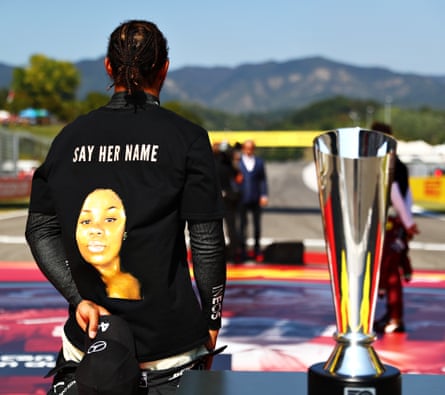The debate will rage over whether Lewis Hamilton is the greatest Formula One driver of all time but, as with all arguments spanning sporting eras, it will never be resolved. What is incontrovertible is that he is F1’s most successful driver and it was recognised in his winning the BBC Sports Personality of the Year award on Sunday.
Hamilton deserved it but had he not won it would not matter a jot. His actions off the track this year stand alongside his remarkable achievements; they had far greater import than what is ultimately a trinket to crown a popularity contest and they engendered a legacy that will span generations.
The 35-year-old took his seventh F1 title this year, matching Michael Schumacher’s record. Having also surpassed Schumacher’s records of pole positions and grand prix wins, Hamilton stands alone at the top of his sport.
He did it with another outstanding display for Mercedes. From 17 races (in which he competed in 16, missing one having contracted Covid-19) he took pole 10 times and won 11.
That he was in another class was epitomised at November’s Turkish Grand Prix, where he sealed the title. Everything was ranged against him. Mercedes struggled at a track that was low on grip and where they could not bring their tyres up to their operating temperature and he qualified in sixth.
What followed was the perfect rebuttal to the bluster of the claim that anyone would be successful in his car. Hamilton displayed a mastery of the wet and drying conditions that was almost otherworldly and few of the other 19 best drivers in the world were able to match it.
He circled flawlessly on the treacherous surface while his rivals slid and spun as if on a different track. He called the race to perfection, with a touch and feel to make his worn tyres last and take a magnificent win.
Difficult conditions allow the greats to shine and this was as memorable a display as Ayrton Senna’s at Donington in 1993.
Hamilton won by 30 seconds from Sergio Pérez and tellingly his teammate, Valtteri Bottas – in an identical car to Hamilton – span six times, had a collision and finished 14th, lapped by the world champion.
Hamilton’s season, indeed his career, have been rich with such outstanding moments, yet it was his strength of character that stood out this year when for once the “personality” part of the Spoty award is appropriate.
He began speaking his mind at the opening round in Australia in March. Under the shadow of the emerging coronavirus pandemic driver after driver repeated the platitudes they had been fed: that the FIA and F1 knew best and they were confident the decisions being made were the right ones. They were not.

He believed holding an event in front of more than 100,000 people was irresponsible and that it should be cancelled. He was even more explicit in stating why it was going ahead. “Cash is king,” he said.
As Covid struck and the race fell apart, then the season and the terrible effects of the virus became clear, one could only further admire Hamilton’s courage in saying what F1 and the FIA had shied away from.
More, of even greater significance followed. After the killing of George Floyd, Hamilton, incensed by the racial injustice, was once more the only driver to voice his anger and desire for change. The silence across F1 was deafening and he called it out. “I see those of you who are staying silent, some of you the biggest of stars, yet you stay silent in the midst of injustice,” he said.
Spurred on, many of his fellow drivers were emboldened to join his condemnation of racial injustice and the trickle became a wave as Hamilton, who had direct experience of racism since he was a child, pushed harder for change. A move for a pause to highlight the anti-racist cause, hurriedly arranged for the first GP, was adopted to take place before every race. F1 had to react and created the We Race As One initiative with a commitment to encourage a greater range of ethnic minorities into the sport.
Hamilton’s team were also invigorated. The drivers’ overalls were to be black and their cars – historically the silver arrows – would be painted for the first time in black livery and they initiated their own diversity programme. Yet Hamilton would not let the cause that was of greater import to him than the world championship slide from view. He began wearing Black Lives Matter T-shirts and repeatedly brought up anti-racism and equality issues.
Nor was this just empty rhetoric. He created and funded the Hamilton Foundation, a long-term project with the Royal Academy of Engineering, to engage young black people in STEM subjects and encourage them to enter motor racing and engineering.

At the Tuscan Grand Prix Hamilton wore a T-shirt drawing attention to the shooting of the black medical worker Breonna Taylor. As the backlash began, especially the tedious, reactionary bleating from the “politics don’t belong in sport” brigade, he was unbowed. “Want you to know I won’t stop using this platform to shed light on what I believe is right,” he said.
It is this fearlessness, this determination to make a difference, that illustrates why Hamilton, for all his glorious skill, deserves acknowledgement this year more than ever. He has 6.1m followers on Twitter and 21.3m on Instagram, he is F1’s most recognised driver and his words travel the world like no other in the sport. How many people had heard of Breonna Taylor before his actions? How many cared about racial injustice? How many young people have had their horizons broadened and their perceptions and prejudices challenged because Hamilton put his position to good use rather than be subsumed in a morass of anonymity?
In 2020, Hamilton stood up to be counted. He did not do it for recognition but because it mattered. Reason enough to celebrate this truly great British sportsperson.

